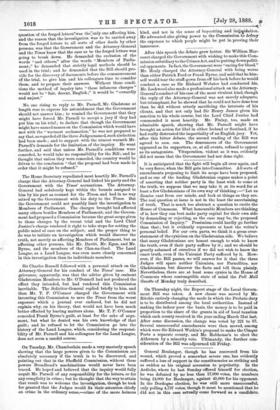After this speech the debate grew hotter. Sir William Har-
court charged the Government with wishing to make this Com- mission subsidiary to the Crimes Act, and to putting down politi- cal opponents. In fact, the Government were "racing for blood." Mr. Healy charged the Attorney-General with being worse than either Patrick Ford or Frank Byrne, and said that he him- self would tear the stuff-gown from off his back before he would. conduct a case as Sir Richard Webster had conducted his. Mr. Lockwood also made a professional attack on the Attorney- General's conduct of his case of the most virulent kind, though the reply of the Attorney-General was not merely adequate, but triumphant, for he showed that he could not have done less than he did without utterly sacrificing the interests of his clients, and that not only had Sir Henry James given his sanction to his whole course, but the Lord Chief Justice had commended it most heartily. Mr. Finlay, too, made an admirable speech, showing that Mr. Parnell might have brought an action for libel in either Ireland or Scotland, if he had really distrusted the impartiality of an English jury. Yet, after this bitter debate, the second reading of the Bill was agreed to nem. con. The denouncers of the Government appeared as its supporters, or, at all events, refused to appear as its antagonists. Vituperation, violent as it was, evidently did not mean that the Government had not done right.


































 Previous page
Previous page